Filter by topic and date
Third Time is a Charm at IETF Hackathon in Prague
14 May 2019
IETF 104 in Prague featured what was by far the biggest and most successful IETF Hackathon ever.
The first IETF Hackathon was in March 2015 at IETF 92 in Dallas. The goals at that time were twofold:
- advance the pace and relevance of IETF standards, and
- attract more developers and young people into the IETF.
That first hackathon had roughly 40 participants working on 6 projects related to a few selected IETF working groups. Fast forward to this hackathon, March 2019 in Prague, where we had nearly 400 people working on over 40 projects that touched on practically everything the IETF does.
This was the third time the IETF has been to Prague since the hackathon started. The first time was IETF 93 in July 2015. That first hackathon in Prague had around 100 participants working on 15 projects, roughly doubling in size from the one just 4 months prior. This confirmed the hackathon experiment as a success and paved the way for it to become an integral part of each IETF meeting ever since. The second hackathon in Prague was at IETF 99 in July 2017, where we had nearly 200 participants working on 28 projects, effectively doubling in size yet again.
More importantly, the hackathon had become integrated into the workflow of most IETF working groups. So perhaps it should not have come as a surprise when this most recent and third hackathon in Prague doubled in size yet again. Many things have changed to accommodate this tremendous growth, but the overall spirit and goals have remained the same.
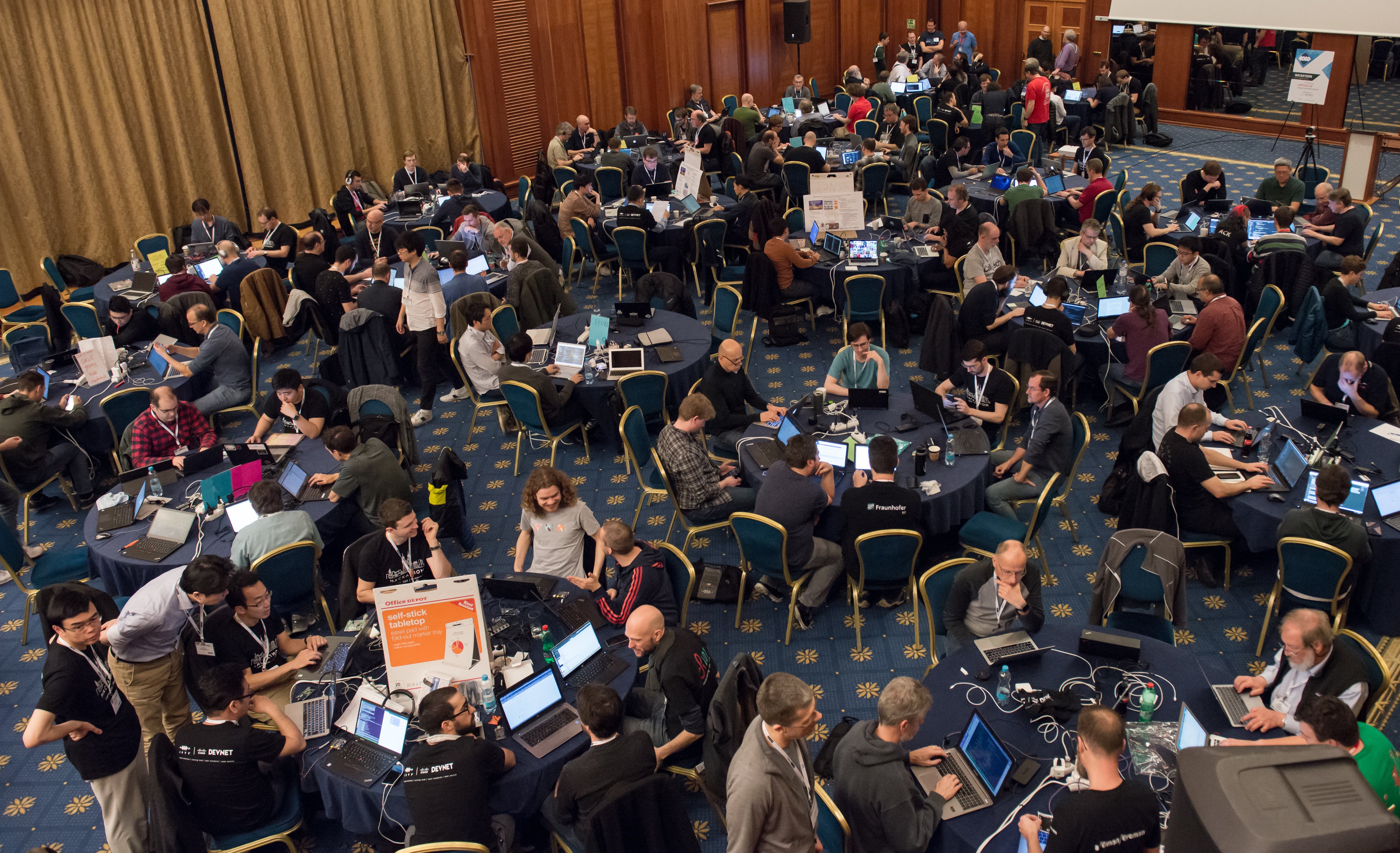
Veterans and newcomers work together
IETF Hackathons are collaborative events with a shared goal of moving IETF work forward. Commemorative t-shirts and laptop stickers are prized takeaways from the event. IETF veterans work side by side with newcomers, exchanging ideas and collaborating on code. This is a great way for newcomers, especially developers interested in networking, security, and other IETF technologies, to have a welcoming experience and start making significant contributions immediately.
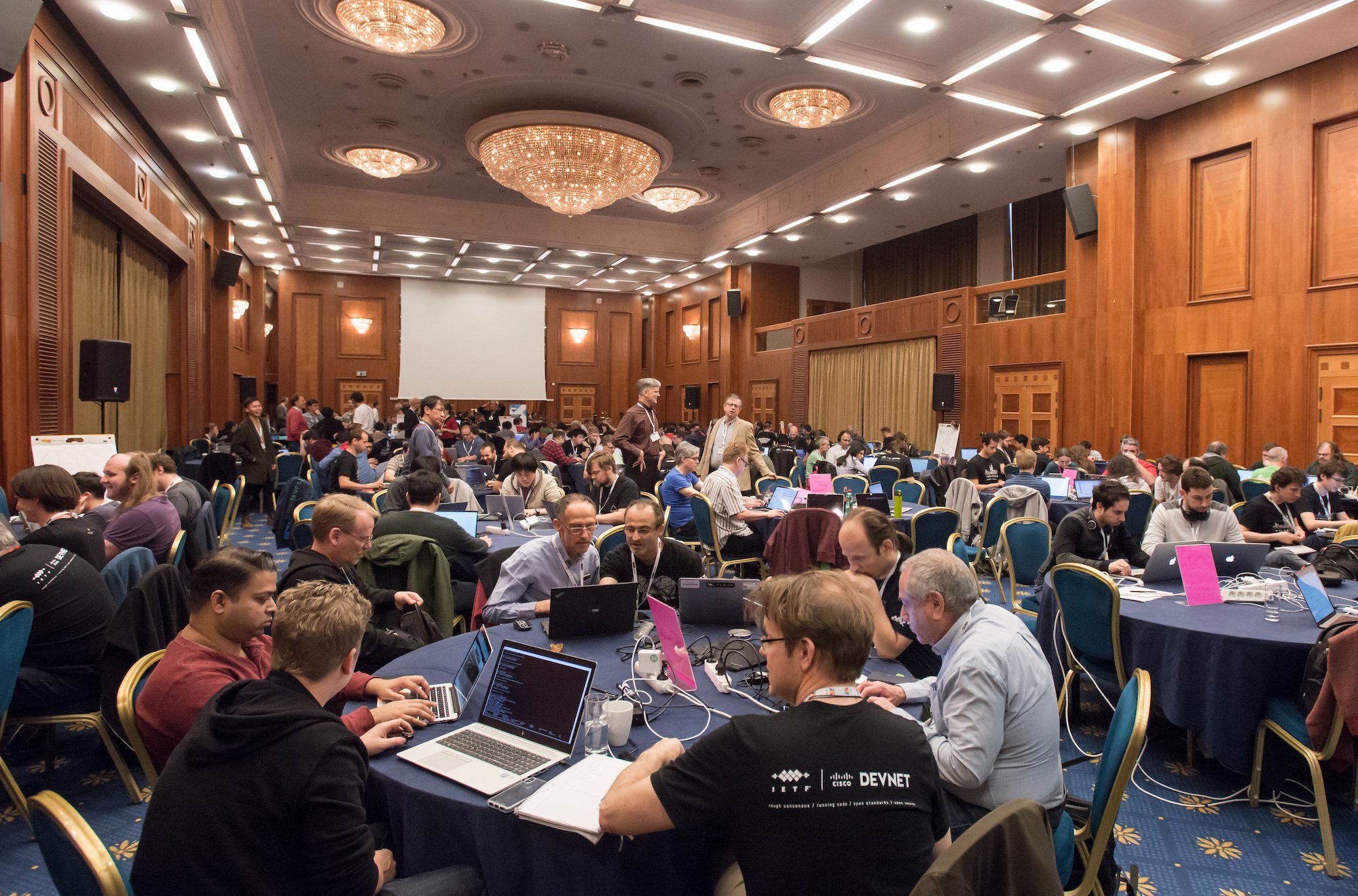
“After attending several IETF meetings, I decided to join the hackathon this time, just to see what it’s all about. Besides meeting cool new people with shared interests, I can now wholeheartedly concur that the hackathon is a great and accessible way to ‘get started’ with contributing to a specific draft, or to a working group as a whole. Something that I found quite daunting before, to be honest. It got me so enthusiastic that I’ve been coding on our project throughout the week and on my travels back home, and I’m looking forward to share my contribution in the working group and meet up again at a next hackathon!”
– Luuk Hendriks
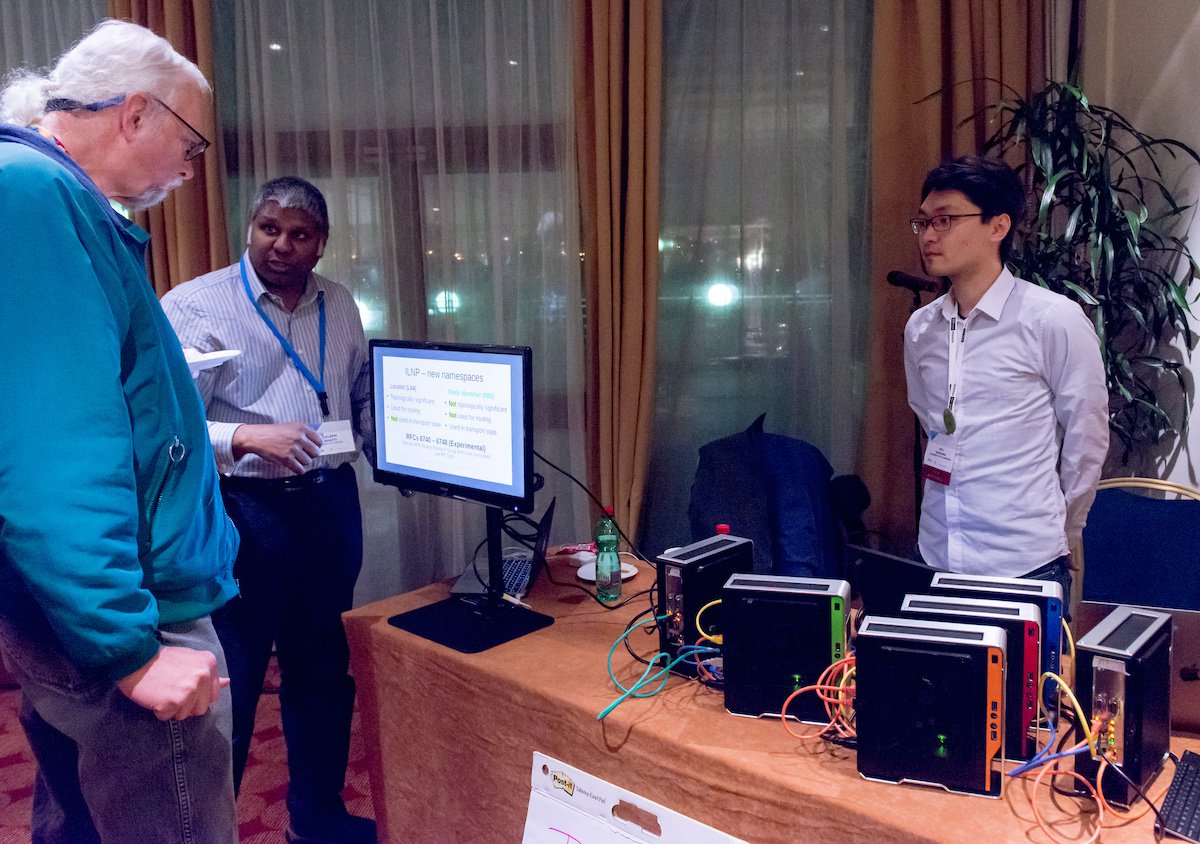
"I had attended previous IETF meetings, including Hackathons, but it was my first where I was demonstrating my own work — the first public demonstration of an implementation of ILNP (RFCs 6740-6748). I attended with my PhD student, Ryo Yanagida, and it was his first IETF meeting.
"It was an excellent event — the Hackathon itself on Saturday and Sunday, and “Hackdemo Happy Hour” on Monday. Ryo and I had lots of people visit us on all three days. They were interested in seeing our demonstration of ILNP mobility-multihoming duality, and it was great to have so many comments, and insightful feedback — both encouragement and constructive criticism. We also found some bugs in our code, which was also useful — things to fix and improve! We also got a chance to see what others in the community were working on.
"Ryo and I came along with our own testbed (shipped from the UK), and so I needed some assistance setting up for the Hackathon and the 'Hackdemo Happy Hour.' I am grateful to the Hackathon organizers for how approachable, friendly, helpful, and professional you all were in assisting me with my slightly unusual requirements. Very much appreciated, many thanks to you all. I look forward to future IETF Hackathons!”
– Saleem Bhatti
Insights gained during the hackathon are brought back into working group meetings that run throughout the following week. This accelerates the standardization process and leads to better standards that are more complete, more precise, and easier to implement.
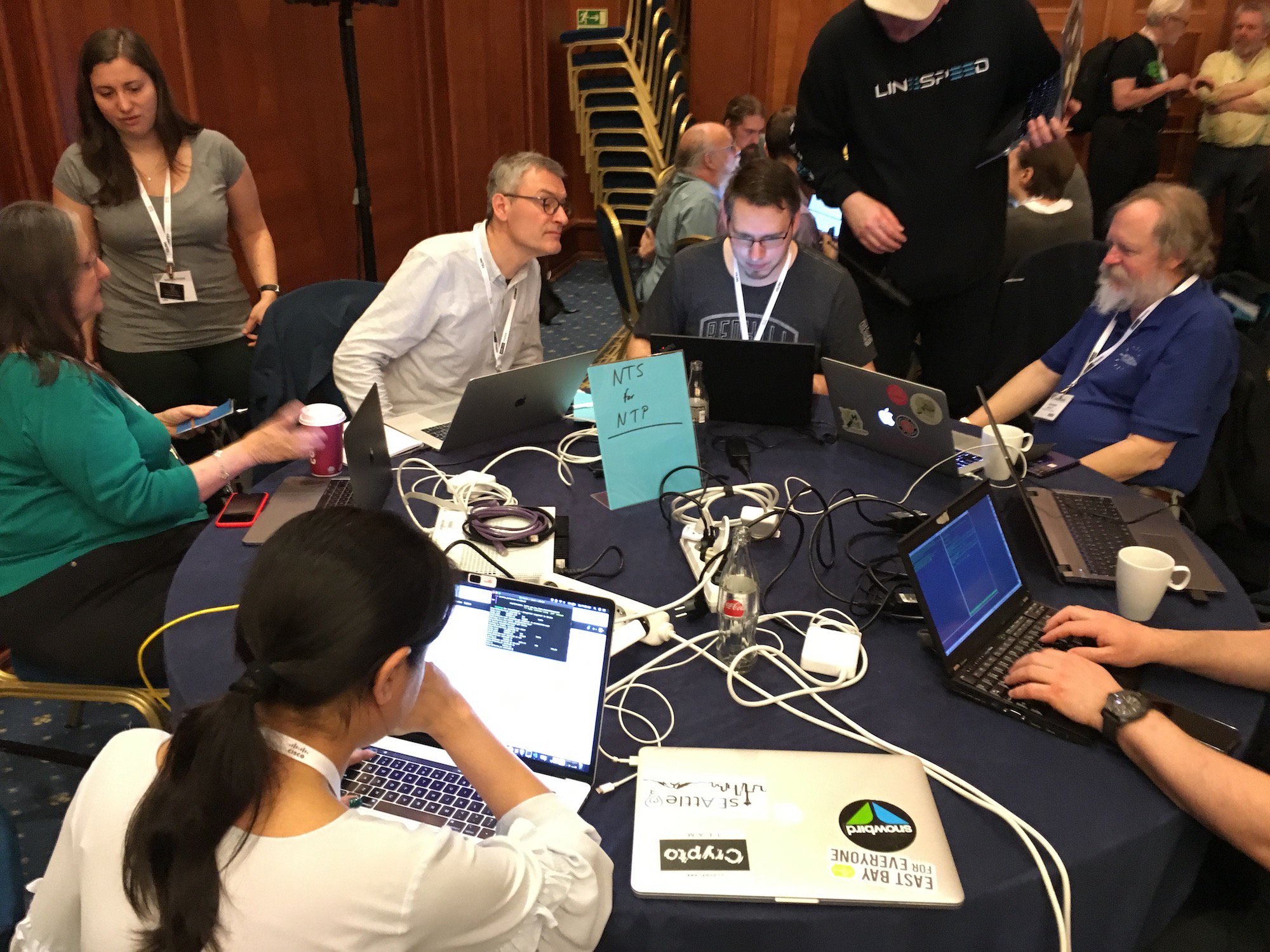
“The Network Time Protocol (NTP) working group had been struggling to make progress on a Network Time Security specification for a number of years. The IETF Hackathons have been very effective at providing focus and building momentum for this effort. We started at IETF 101 hackathon, where we were able to demonstrate a couple of initial prototype implementations to provide initial validation for the specification. By the IETF 104 hackathon, we were able to demonstrate successful interoperability between four independent implementations. We had as many remote participants as we had locally in Prague, and with the final tweaks to the specification incorporated, we are now ready to move forward with it.”
– Karen O’Donoghue
More information about all the projects at the hackathon can be found on the hackathon wiki. At the end of the hackathon, teams gave brief presentations summarizing what they achieved and sharing lessons learned with the rest of the IETF community. These presentations are available via the IETF Hackathon GitHub.
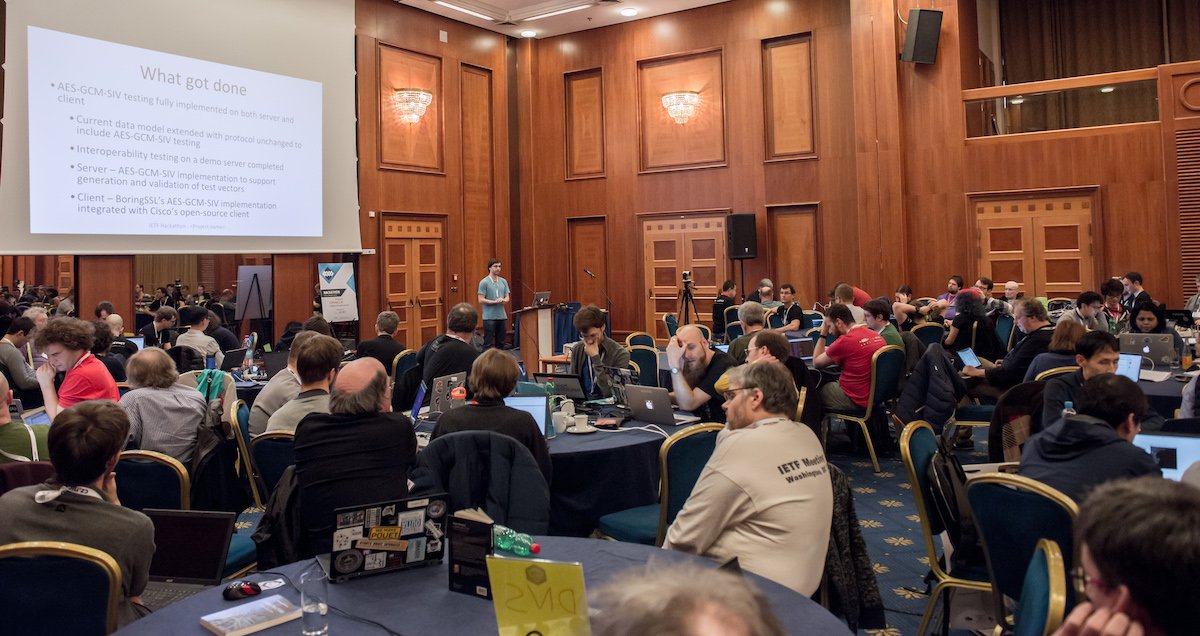
Cisco DevNet sponsored and ran the first several hackathons and continue to be big hackathon supporters. Oracle sponsored the hackathon at IETF 104 in Prague. We welcome and encourage additional sponsors for future hackathons to ensure it remains a free event accessible to everyone. The next IETF Hackathon is at IETF 105, in Montreal, July 20-21. I hope to see you there.
Originally published on the Cisco Blog. Republished with permission.
Photos: Stonehouse Photographic